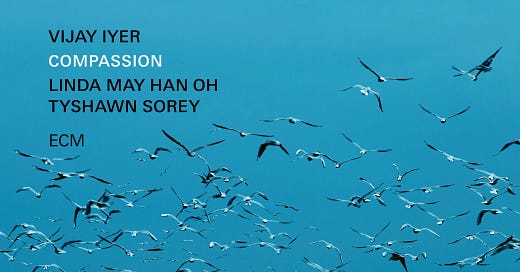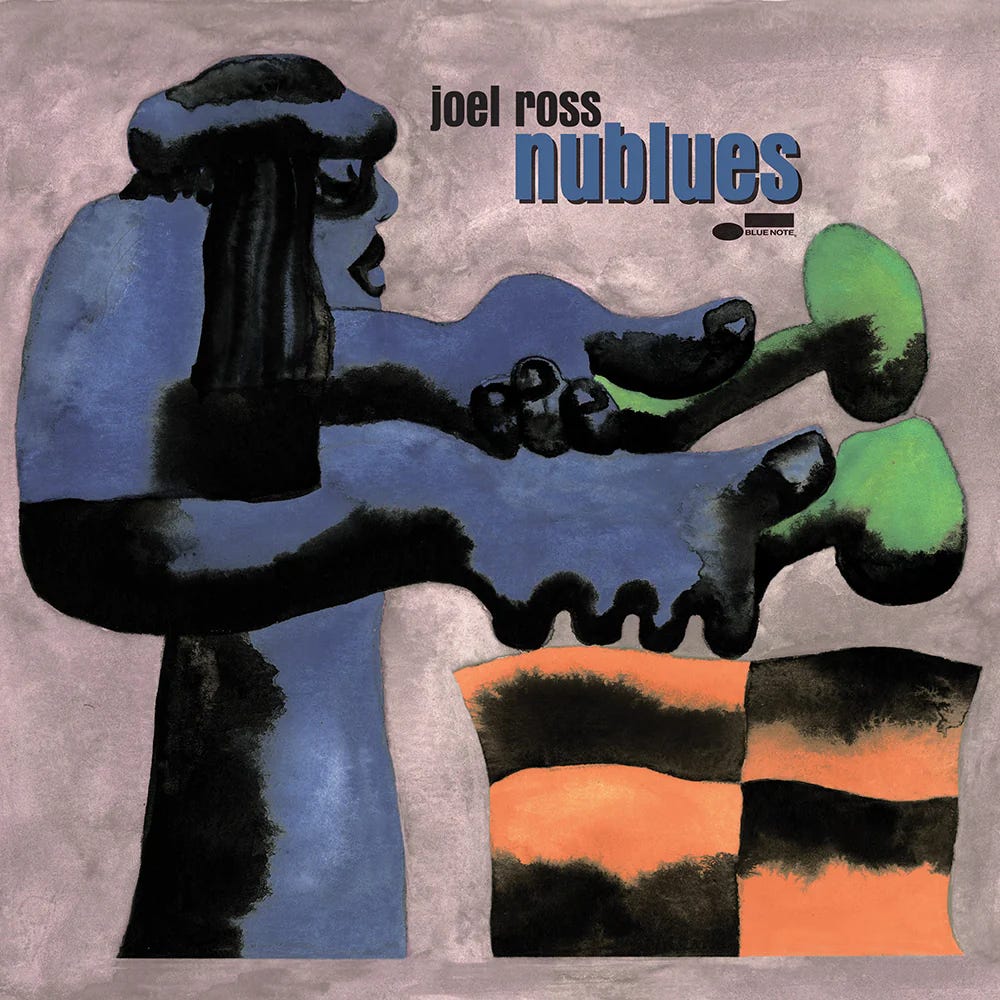Vibe Check
Storied pianist Vijay Iyer charts a course through political unrest, while vibraphone master Joel Ross relaxes with a suite of ballads and blues.
Vijay Iyer - Compassion
Even working in an instrumental setting, pianist Vijay Iyer always makes his political sensibilities clear. On a 2017 album called Far From Over, he conveyed his belief in collective action through the rowdy, take-it-to-the-streets energy of Charles Mingus’ big bands. Released a year into the COVID pandemic, his first team-up with Linda May Han Oh and Tyshawn Sorey bore the apt title Uneasy, with music that lived up to its name. On the latter album, even the titles of the songs suggested ripped-from-the-headlines urgency: “Combat Breathing” bore solidarity with Eric Garner, and “Children of Flint” spoke for itself.
Iyer has reconvened this extraordinary trio in a season where there is arguably as much as ever to feel uneasy about. The song titles don’t have the same topical specificity, though compositions like “Maelstrom” and “Tempest” recall the old Chinese curse about living during interesting times. The album is called Compassion, and while it’s of a piece with its predecessor, it subtly shifts the focus from agitation toward resilience, courage, and forward momentum— values that have long been integral to Iyer’s sound.
Maybe one of the reasons why Iyer’s music conveys a political intention is that he understands jazz as innately political. By emphasizing communal creation, jazz rejects rugged individualism, and with it many of the stories that America loves to tell about itself. His work with Oh and Sorey embodies this notion, celebrating the freedom of individual voices not as an end unto itself, but as a means for building something together.
Even more than his classic trio with Stephan Crump and Marcus Gilmore, Iyer’s current band feels synergistic. Though the pianist’s aesthetic principles illuminate the way forward, Oh and Sorey aren’t just here as background support. Their contributions are elastic, adaptable, and symphonic— Oh’s bass can be percussive but just as often it carries the melody, and Sorey’s drumming is by turns driving, rumbling, and painterly. Compassion frequently recalls other classic trio albums where the interplay is so deft that it feels like you’re listening to a singular voice— think Motian, Frisell, and Lovano on I Have the Room Above Her.
Like that album, Compassion belongs to the ECM label, which carries an aesthetic history of its own. Since its inception in 1969, ECM has been a nexus of high-brow jazz, classical, and improvisational music, and its reputation is for pristine-sounding recordings that are both elegant and atmospheric. It’s the perfect home for a musician like Iyer, who has a knack for making ideologically-rich music sound simple, tuneful, and appealing.
Some of his most pleasurable music comes when he foregrounds rhythm, as he does on a cheerful thumper called “Ghostrumental.” Building from a simple vamp to ecstatic improvisation from all three musicians— Oh’s low-end dexterity is especially noteworthy— the song belongs in the same rumbustious lineage as Iyer’s 2009 “Galang” cover, or 2015’s techno-inspired “Hood.”
Compassion also evinces Iyer’s thoughtful approach to repertoire playing. Roscoe Mitchell’s “Nonaah” provides a two-and-a-half-minute palette cleanser at the center of the album, briefly disrupting the album’s tasteful ECM aesthetic with a jolt of boisterous dissonance. At the other end of the spectrum is a crowd-pleasing cover of Stevie Wonder’s “Overjoyed”— eight glorious minutes of chiming melody and irresistible groove.
Perhaps these feats of co-creation between Iyer, Oh, and Sorey explain why Compassion sounds so buoyant, even as it unflinchingly reflects the anxiety of the current moment. For the duration of the album, Iyer’s trio embodies an ideal— a shared vision of determination in the face of uncertainty, beauty amidst chaos.
My rating: 8 out of 10
Joel Ross - nublues
As he prepared to record his fourth album for the venerable Blue Note label, vibraphonist Joel Ross asked himself a simple question: Have I been making things too difficult?
Since the release of KingMaker in 2019, Ross has solidified his reputation as one of the most exciting bandleaders of his generation. Not only is he a versatile musician, embracing the tactile pleasure of his instrument through playing that’s both percussive and tuneful, but he’s also a deep conceptual thinker. My favorite of his albums, 2020’s Who Are You?, is a sophisticated melange of tempos, structures, tones, and ideas. It’s an engrossing record with a lot going on.
But after 2022’s The Parable of the Prophet, a concept album meant to reflect a Sunday morning church liturgy, Ross wondered if he was asking too much from his audience. He approached his next album with a mantra to simplify, focusing on direct emotions, clean melodies, and familiar forms. The result is nublues, a leisurely set that finds Ross and his band easing into the hospitable sounds of ballads and blues.
For jazz enthusiasts who appreciate a good old-fashioned blowing session, nublues is pure comfort food. Though the tempos are relaxed throughout, Ross and his band provide plenty of explosive, alchemic energy— particularly saxophonist Immanual Wilkins, who blows red-hot blues on one song after another. Working with mostly original compositions, Ross makes good on his promise for a straightforwardly tuneful outing; not for nothing is one song called “mellowdee.”
There are hints that simplifying doesn’t come easily to Ross. At almost 70 minutes, the album flows like one long, interconnected suite, suggesting an auteur who only knows how to paint on the largest of canvases. A song called “bach (God the Father in Eternity)” alludes to Ross’ long-running obsessions with both classical and church music, a whiff of the highfalutin amidst the otherwise earthy sonic signifiers.
These are features, not bugs— and by the time nublues arrives at its penultimate track, a glittering eight-minute romp through Thelonious Monk’s “Evidence,” it’s clear that Ross has succeeded in what he came to do. He’s made an instantly appealing jazz record that provides succor and stimulation in equal measure.
My rating: 7 out of 10






